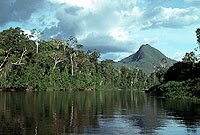 |


 |
|
||
  |
||
|
 Climate, Community & Biodiversity Alliance Challenge Overwhelming scientific evidence shows that current greenhouse gas (GHG) emission levels threaten climate stability. This will likely cause serious and undesirable impacts for humans and ecosystems alike. Furthermore, climate change is occurring while record numbers of people live in poverty, and massive biodiversity loss continues unchecked. Making matters worse, climate change is expected to exacerbate poverty and environmental loss in many of the poorest countries. Designing resilient actions that address these multiple global problems simultaneously is one of humankind’s most pressing and time-sensitive challenges. The Alliance The Climate, Community & Biodiversity Alliance (CCBA) was formed to respond to this challenge. The CCBA is a CELB-convened partnership between ten of the world’s leading companies and NGOs seeking to leverage markets to foster the development of forest protection and restoration projects around the world that deliver significant climate, local community and biodiversity benefits. To achieve this goal, the CCBA is helping jump-start the creation of a robust, global market for multiple-benefit land-based projects and their associated carbon offsets, and promoting the adoption of the Climate, Community & Biodiversity (CCB) Standards by project developers, investors and policymakers. CCBA members include five companies—BP, Intel, SC Johnson, Weyerhaeuser and GFA (Germany)—and five NGOs—Conservation International, the Hamburg Institute of International Economics, Pelangi Indonesia, The Nature Conservancy and the Wildlife Conservation Society. The CCB Standards After two years of intensive multi-stakeholder consultation, field testing on four continents, and peer review by the world’s leading tropical forestry institutes, the CCBA launched the Climate, Community & Biodiversity Standards. These Standards evaluate land-based carbon mitigation projects in the early stages of development. The CCB Standards foster the integration of best-practice and multiple-benefit approaches into project design and evolution. To earn approval under the CCB Standards, projects must satisfy 15 required criteria to demonstrate compelling net benefits for fighting climate change, conserving biodiversity, and improving socio-economic conditions for local communities. The CCB Standards:
The Climate, Community & Biodiversity Standards are an invaluable tool for businesses undertaking climate change mitigation activities and other forest-based activities. Companies can use the CCB Standards to effectively screen land-based carbon projects prior to supporting them. The Standards enable corporate investors to identify exceptional, high-quality projects that will generate the greatest returns for the lowest risk. In addition, supporting multiple-benefit projects can create valuable regulator, employee and customer goodwill. Finally, the CCB Standards can help companies protect their corporate reputation by screening out projects that could lead to negative ancillary outcomes and by highlighting project design improvements that may be needed. The Alliance in Action The CCBA’s vision is to leverage market mechanisms and private-sector innovations to contribute to the restoration and conservation of millions of hectares of threatened biodiversity-rich ecosystem habitats around the world, the generation of thousands of sustainable livelihoods in some of the poorest countries, and the stabilization of global climate change. The CCBA spent its first two years on the foundation component of its strategy—developing a set of practical and credible standards for designing and evaluating multiple-benefit forestry projects. The resulting Climate, Community & Biodiversity Standards have already garnered broad interest and acclaim from project developers, investors and regulators since their release in 2005, and have become the leading tool of their kind. A rapidly growing number of projects are using the Standards, the Chinese government has endorsed them as an effective means to help their country develop sustainable forestry initiatives, and the German government is seeking to use them. In addition, the world’s preeminent investors and carbon project consultancies, including the World Bank and EcoSecurities, are applying the CCB Standards to their extensive project portfolios. Now the CCBA is turning its attention to fostering the creation of a policy and market environment that promotes the large-scale implementation of multiple-benefit forest protection and restoration activities around the world. Most of the key greenhouse gas regulatory and voluntary frameworks will be determining how they deal with forestry over the next few years. As a recognized leader in this field, the CCBA has an unprecedented opportunity to define the rules of the game concerning the role, and the extent to which, multiple-benefit land-based projects will play in addressing global climate change. If you are interested in joining the Alliance, learning more about the Standards, or getting the latest information on CCBA Activities or Events, please visit http://www.climate-standards.org/ 
|
 Rainforest on the Orinoco River, Venezuela. ADDITIONAL RESOURCES CCBA MEMBER FAST FACTS • BP • Conservation International • GFA Terra Systems • Hamburg Institute of Int. Economics • Intel • Pelangi • SC Johnson • The Nature Conservancy • Wildlife Conservation Society • Weyerhaeuser PUBLICATIONS • Conservation International's Climate Strategy Fact Sheet (pdf, 812kb) • CCBA Fact Sheet (pdf, 566kb) • CCB Standards Fact Sheet (pdf, 958kb) • Article: Biodiversity, Climate, and the Kyoto Protocol: Risks and Opportunities (pdf, 1.74mb) • Article: Land Use Carbon Credits (pdf, 227kb) WEBSITES • Official CCBA Website |
|